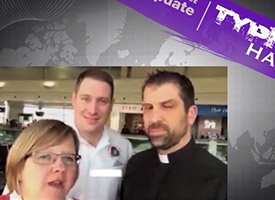Rev. Paul J Cain, Jr.
St. Luke 13:22-30
Come to the Feast
Proper 16C, Fourteenth Sunday after Pentecost, 25 August
2013
Immanuel Lutheran Church, Sheridan, Wyoming
For a Lay Reader
Grace, mercy, and peace to you from God our Father and
from our Lord and Savior Jesus Christ. Amen.
The Holy Gospel according to St. Luke, the thirteenth
chapter:
22 Then Jesus went through the towns and villages, teaching
as he made his way to Jerusalem. 23
Someone asked him, “Lord, are only a few people going to be saved?” He said to
them, 24 “Make every effort to enter
through the narrow door, because many, I tell you, will try to enter and will
not be able to.
25 Once the owner of the house gets up and closes the door,
you will stand outside knocking and pleading, ‘Sir, open the door for us.’ “But
he will answer, ‘I don’t know you or where you come from.’
26 “Then you will say, ‘We ate and drank with you, and you
taught in our streets.’ 27 “But he will reply, ‘I don’t know you or where you
come from. Away from me, all you evildoers!’
28 “There will be weeping there, and gnashing of teeth, when
you see Abraham, Isaac and Jacob and all the prophets in the kingdom of God,
but you yourselves thrown out. 29 People
will come from east and west and north and south, and will take their places at
the feast in the kingdom of God. 30
Indeed there are those who are last who will be first, and first who will be
last.”
This is the
Gospel of the Lord.
It is not
the desire of the Lord that any should perish, but that all would have eternal
life, turning from the wide way to life. The Devil, the World, and human sinful
flesh have been extraordinarily creative in confusing us about who will and who
will not be saved.
Most world
religions say they have an exclusive claim on the truth. Which one is correct?
Scripture tells us to test the spirits to see which are of God. Only the one
that confesses that Jesus Christ came in the flesh qualifies. Which name are we
to call upon? The Lord tells us to have no other gods. He also directs us to the
only name given to men by which they must be saved, Jesus Christ.
Even within Christianity, one can be confused. Denominations
today twist the scriptures to make them say what is politically correct. Some
simply reject part of what Jesus has to say to us. In their error, they make
Jesus into a new Law-giver like Moses. Some reject baptizing infants. Some
demand allegiance to bishops and prayers to the dead. Others approve of all
kind of sexual deviations from the divine ideal of marriage. We see promiscuity
ignored. Living together outside of marriage is all but approved. Homosexuality
is promoted as an alternative, “loving” lifestyle. The most dangerous error—in
the eyes of the world—is the one that says you can follow Jesus, or Buddha, or
Mohammed, or Joseph Smith—it doesn’t really matter. That is NOT the teaching of
the Jesus of Scripture.
Jesus desires that you would be saved and have a knowledge
of the Truth, the one Truth, His Truth. He calls you to come to the Feast.
Narrow is the way that leads to eternal life.
22 Then Jesus went through the towns and villages, teaching
as he made his way to Jerusalem.
Jesus has been on His way to Jerusalem since He descended
from the Mount of Transfiguration. Then He set His face toward Jerusalem. Jesus
knew why He had come, why He had been sent. He was on His way to Jerusalem to
die so that you could come to the feast, His Feast at the Last Day. Verse 22
ties Jesus’ teaching to His crucifixion at Jerusalem.
23 Someone asked him, “Lord, are only a few people going to
be saved?”
Which of us hasn’t asked this or a related question about
salvation? Is my neighbor going to be saved? Is my spouse going to be saved?
Are our children going to be saved? Am I going to be saved? Jesus directs His
response along the lines of, “Are you, questioner, are you, dear reader, dear
listener, going to be saved?”
[Jesus] (He) said to them,
24 “Make every effort to enter through the narrow door, because many, I
tell you, will try to enter and will not be able to.
Make every effort to enter though the narrow door. Effort.
Struggle. It is a lifelong struggle, a tug-of-war between the new man you are
in Christ and the Old Adam of your sinful flesh. This is the struggle of all
the baptized. All alone, the struggle would be lost for you or me. But we are
not alone. Our Lord, the Victor over sin, death, and hell is fighting on your
side. He calls you to Come to the Feast, and also to be ready and nourished for
battle.
We our nourished by remembering our baptism through daily
contrition and repentance. We are nourished by time with other believers who
can encourage us when the battle is heated. We are strengthened as we come to
the Feast of Christ’s Body and Blood which is a preview of that which is to
come. We are strengthened by our time in His Word when He speaks to us.
This week we have provided many opportunities for you to be
strengthened by God’s Word in addition to your own daily family and individual
devotions and Our Lord serving you in this Divine Service. Sunday School continues
year-round along with Adult Bible Class. Midweek Bible Study resumes in
September along with youth Confirmation classes. New member classes are ongoing.
We speak to the Lord in prayer. We don’t hear from Him apart from His Word. His
Word keeps us on His narrow way of life.
Are only a few people going to be saved? Yes. Only a few are
going to be saved. The door is as narrow as the name of Jesus. The door is as
narrow as the cross of Calvary.
Many will try to enter and will not be able to. They want to
enter based upon their own merit. “I live a good life. Won’t God accept that?”
Or, “Look, Lord, see how full my day planner is of good works for you!” A
library full of day planners, even from habitually effective people, is not
enough. A good life is not sufficient. The focus of this verse is not upon the
effort, the struggle, but upon the narrow door. The door is as narrow as the
name of Jesus. The door is as narrow as the cross of Calvary. When they see
that the door won’t open for their good deeds, they will stand outside knocking
and pleading. He came unexpectedly. They were surprised when the door was
closed.
25 Once the owner of the house gets up and closes the door,
you will stand outside knocking and pleading, ‘Sir, open the door for us.’ “But
he will answer, ‘I don’t know you or where you come from.’
In the ancient world, when getting to know a person, it was
common to ask where the person had come from, since a person’s hometown, tribe,
nationality, or prior activity often revealed something about the person’s
character. The master here has no familiarity with those outside since he has
no familiarity with their place of origin. He has nothing in common with them,
no ties to them whatsoever.
It is not so with you. You are the baptized. The Lord has baptized
you. He has placed His name on you and has promised to bless you. He will not
abandon His Name.
The baptized, however, can abandon Him. Church may become
nothing more than a social club, a place to have one’s name on the rolls, a
place to come to be entertained each Christmas and Easter. That cannot save
you. Do not despise the gift of your Baptism. Do not delay being baptized. Do
not put off having your children baptized. Do not despise your own baptism.
That would leave one outside the door.
26 “Then you will say, ‘We ate and drank with you, and you
taught in our streets.’ 27 “But he will reply, ‘I don’t know you or where you
come from. Away from me, all you evildoers!’
Those apart from Christ are evildoers. They are without
faith. Anything done apart from faith is sin. Unforgiven sin is damnable. Even
just one. He taught in their streets. They say nothing about having heard,
having understood, or having put into practice His teaching.
28 “There will be weeping there, and gnashing of teeth, when
you see Abraham, Isaac and Jacob and all the prophets in the kingdom of God,
but you yourselves thrown out. 29 People
will come from east and west and north and south, and will take their places at
the feast in the kingdom of God. 30
Indeed there are those who are last who will be first, and first who will be
last.”
Christ
Jesus, the Son of God, ruler of Heaven, was First and became last—for you. He
took upon human flesh in the womb of Mary. He became a servant, your servant.
He became your servant in His going throughout the towns and villages, teaching
as He made His way to Jerusalem. There He became the very last, despised,
accursed, for cursed is everyone who hangs upon a tree. There was great weeping
there, but that weeping was turned to joy three days later when Jesus revealed
Himself Risen from the dead!
His
Resurrection makes us, who were last in the kingdom of God because of our
unrighteousness, righteous and first. Once the owner of the house, Jesus,
returns on the Last Day and closes the door, you who believe will no longer
weep, or gnash your teeth for He will come and wipe every tear from your eye.
You will
see Abraham, Isaac and Jacob and all the prophets in the kingdom of God. You
will be among those people coming from the east and west and north and south to
take their places at the feast in the kingdom of God.
Come to the
Feast! Our Gracious God and heavenly father has given us a foretaste of this
feast to come next week in the Holy Supper of Christ’s Body and Blood.
He alone can keep us firm in the true faith throughout the days of our struggle
during our earthly pilgrimage that, on the Day of His coming, we may, along
with all His saints, celebrate the marriage feast of the Lamb in His kingdom.
Come to the Feast! Amen.
The peace of God, which passes all understanding, keep
your hearts and minds in Christ Jesus. Amen.



